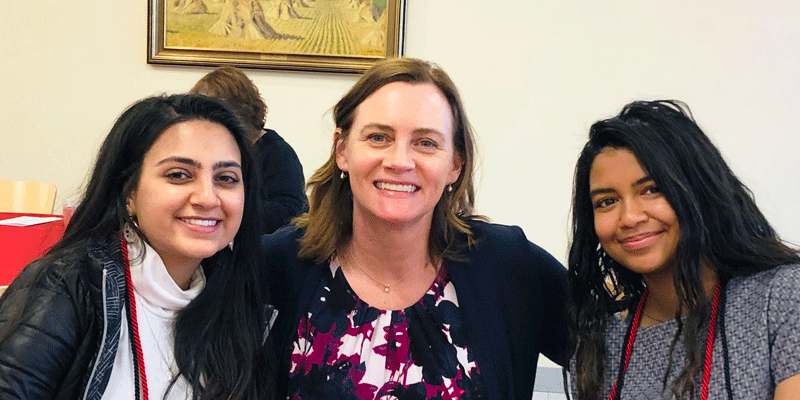Health Professions LEAP

DEVELOP VALUABLE SKILLS
- Critical thinking and effective reading strategies.
- Fluency in oral and written expression.
- The ability to work effectively in teams.
- Library research skills - In the spring semester you can sign up for LEAP 1060 to receive an extra hour of credit for completing library work folded into your LEAP class.

GET CONNECTED
- Your professor. Have the same professor both Fall and Spring.
- Your classmates. You’ll be with your peers for both semesters.
- Your Peer Advisors. Get assistance from an experienced LEAP student who will know how to help you be successful in your course.
- Your peers. Get involved with other LEAP students at events and lectures.
Health Professions Course Description
This two semester course examines bio ethical issues through the framework of humanities in order to situate health care within its essential human context. The class also examines diverse cultural groups in the United States for the purpose of developing cultural competence in providing health care to these groups.
In the first semester of this course the emphasis will be on studying how individuals who work in, train for, or encounter the health care system in America have perceived and attempted to bridge gaps between dominant and marginalized communities.
Reading autobiographies and biographies of such individuals, students will examine ways in which the writers and subjects of these texts acted as explorers and “translators”: building, interrogating, or rejecting relationships between the American mainstream and their communities of origin: African-American, Latina/o, Asian-American, American Indian, and others. These readings prepare students for next semester’s more exclusive focus on ethics in health care delivery and how both dominant and marginalized communities address and experience these concerns.
Also, directly relevant to students’ career interests is the semester research project, in which teams of students investigate the health concerns of particular marginalized populations and the cultural/historical backgrounds to these concerns.
In this semester, we will continue our first semester exploration of the nature of community identity and the way individuals connect with their communities and bridge disparate communities. However, we will shift our focus from non-dominant racial, ethnic, or cultural communities to the medical and health care delivery community as it interacts with those it serves, asking:
- What does a community of health professionals mean?
- Who constitutes such communities and how is membership determined? Are such communities hierarchical? Should they be?
- What are members’ obligations to other community members and to the communities of patients and patient families they serve? What happens when these obligations conflict?
- Are markers of race, class, ethnicity, religion, and gender important to community membership? Are they important considerations when serving a community of patients?
- How does an effective health care delivery community function in terms of setting standards and answering moral/ethical questions?
Nora Wood, Ph.D.
Rebecca Larsen, Ph.D.
Rachel Borup, Ph.D.
Steve Maisch, Ph.D.
Health Sciences LEAP
Health Sciences LEAP is a pipeline program for students from underrepresented groups interested in a graduate program in healthcare. Freshman students will enroll in Health Professions LEAP for Fall and Spring and will then apply to be accepted into the program for their Sophomore, Junior, and Senior years. Eligible students include:
- Marginalized communities in healthcare/medicine
- First generation college students
- LGBTQ+ students
- Pell grant eligible students
- Students from rural communities
For more information about HEALTH SCIENCES LEAP contact Kaley Tucker - kaley.tucker@utah.edu
Applications for the Health Sciences LEAP program will open again in Spring 2024.
